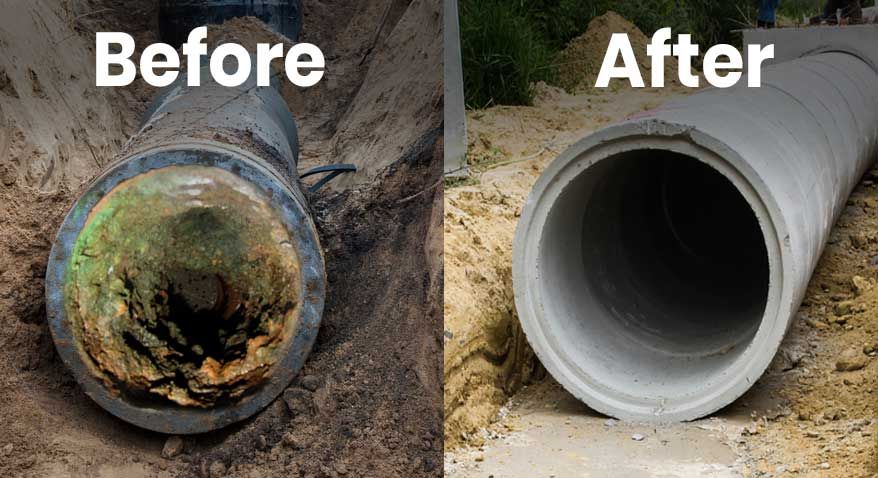Dealing with a damaged drain is never fun. Whether it’s a slow-draining sink, a recurring blockage, or a bad smell that just won’t go away, these signs often point to something more serious happening underground. One of the most effective solutions to fix these problems without digging up your garden or driveway is drain lining.
In this blog, we’ll break down what drain lining is, why it matters, how it compares to traditional repairs and when you should call in the pros.
What is Drain Lining?
Drain lining is a no-dig method of repairing damaged or cracked pipes from the inside. Instead of digging up the ground to access and replace broken drainpipes, a resin-soaked liner is inserted into the damaged pipe. Once in place, it hardens and forms a new pipe within the old one. This process is also known as drain pipe lining or CIPP (Cured-In-Place Pipe) lining.
The best part? It’s clean, efficient and causes minimal disruption to your property.
Why Lining a Drain is a Smart Choice
If your drains are cracked, leaking, or causing backups, lining a drain can save you a lot of hassle (and money) compared to digging and replacing the entire system. Here are some of the benefits:
1. No Excavation Required
Traditional drain repair involves digging trenches to reach the damaged pipe. This can be messy, time-consuming, and expensive—especially if the drain runs under a patio, driveway, or even your home. Drain lining repair avoids all that by working inside the pipe.
2. Cost-Effective
Because there’s no digging involved, labour and restoration costs are significantly lower. You also avoid the added expenses of re-laying tiles, paving, or landscaping.
3. Fast and Efficient
Most drain lining jobs can be completed in a day or less. That means less downtime, less disruption, and quicker results.
4. Long-Lasting
When done correctly, a lined drain can last for decades. The new lining is durable, corrosion-resistant, and designed to handle everything your drainage system throws at it.
Signs You Might Need Drain Lining
Not sure if drain lining repair is the right fix? Here are some common signs that your pipes may be damaged and in need of attention:
Persistent blockages or slow drainage
Bad smells coming from sinks or drains
Gurgling sounds from the pipes
Wet patches in the garden or driveway
Water backing up in toilets or sinks
If you’re experiencing one or more of these issues, it could be time to look into lining a drain before the damage gets worse.

Drain line Cleaner vs Lining A Drain
Sometimes, all your pipes need is a good clean. A drain line cleaner can help clear minor blockages caused by grease, soap scum, or hair. Regular maintenance with a professional drain cleaning service can prevent buildup and keep your drainage system flowing smoothly.
However, if the problem keeps coming back—or if your drains are cracked, collapsed, or invaded by tree roots—cleaning alone won’t be enough. That’s where drain lining comes in. It doesn’t just treat the symptoms, it fixes the root cause by sealing cracks, gaps, and weak spots.
What Happens During the Drain Lining Process?
If you’re curious about how drain lining actually works, here’s a quick rundown:
CCTV Drain Survey
A camera is sent down the pipe to inspect the damage and determine if drain pipe lining is suitable.Cleaning the Drain
Before the lining can be installed, the drain must be thoroughly cleaned—often using a high-pressure drain line cleaner.Installing the Liner
A felt liner soaked in resin is pushed or pulled through the damaged section of the pipe.Inflation and Curing
The liner is inflated using air or water to press it against the existing pipe walls. It’s then left to cure (harden) in place.Final Inspection
Another camera inspection ensures that the liner is correctly installed and the pipe is ready to use again.
Why You Shouldn’t DIY Drain Lining
While there are DIY drain unblocking tools and chemical cleaners out there, drain lining is not something you can (or should) try to do yourself. The equipment and expertise required to install a liner properly mean it’s a job best left to the professionals.
Incorrect installation can lead to further damage, poor water flow, or even total failure of the pipe system. So, even if you’re tempted to take the DIY route—don’t. Call in experienced drainage experts who know how to do it right the first time.
Drain Lining in London
Living in a city like London means older properties and older plumbing systems. Many homes and commercial buildings across the city are dealing with aging drainpipes that are more vulnerable to cracks, corrosion, and root invasion.
Drain lining in London has become an increasingly popular solution thanks to its speed, convenience, and effectiveness in urban settings where digging up roads and pavements is less than ideal.
Whether you own a townhouse, a flat, or a business property, keeping your drains in top shape helps avoid costly repairs down the line.
Call the Pros Before It Gets Worse
Drain issues can escalate quickly. What starts as a small leak can lead to full-blown flooding or property damage if ignored. If you suspect a problem, don’t wait—get a drain survey and find out if drain lining repair is the right option.
Professional drainage experts have the tools, training, and experience to diagnose and fix the problem with minimal disruption. They’ll let you know whether a simple drain line cleaner will do the job, or if drain pipe lining is needed for a permanent fix.
Drain Pipe Lining
Drain lining is a modern, mess-free solution to damaged pipes. Whether you’re dealing with recurring blockages, cracked pipes, or strange smells, lining a drain can save you time, money, and stress.
Don’t wait for small problems to become big ones. If you need drain lining in London or anywhere else, get in touch with trusted drainage professionals who can get your pipes sorted—quickly and properly.
Call The Experts Now!
Think your drains might need attention? Don’t wait for a small issue to become a costly repair—call the professionals today and get your drainage system back to full flow.

